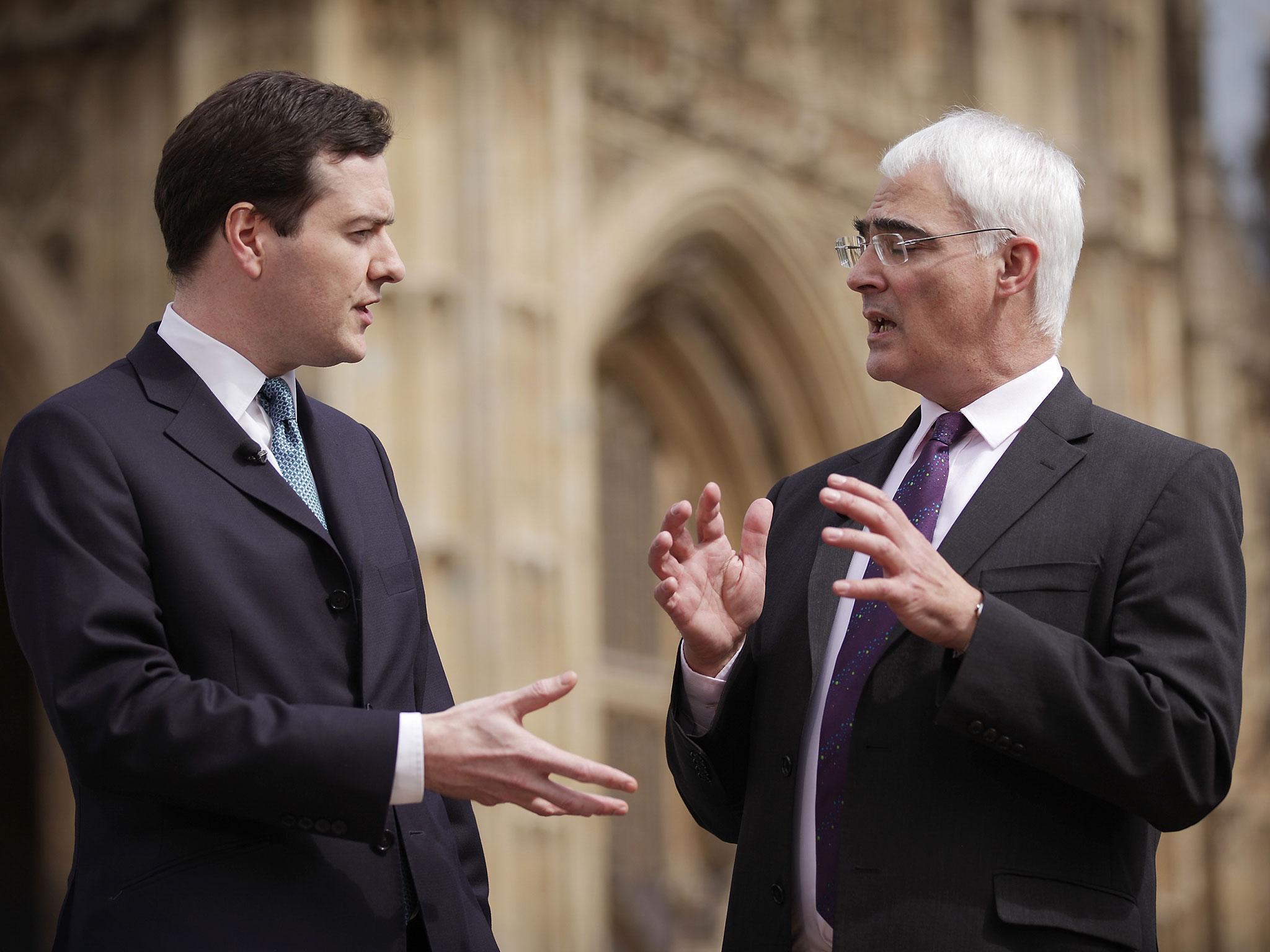Brexit would spark £30bn in spending cuts and tax rises, warn George Osborne and Alistair Darling
Chancellor and his predecessor to claim emergency Budget would be necessary to plug black hole in public finances in event of vote to leave

Your support helps us to tell the story
From reproductive rights to climate change to Big Tech, The Independent is on the ground when the story is developing. Whether it's investigating the financials of Elon Musk's pro-Trump PAC or producing our latest documentary, 'The A Word', which shines a light on the American women fighting for reproductive rights, we know how important it is to parse out the facts from the messaging.
At such a critical moment in US history, we need reporters on the ground. Your donation allows us to keep sending journalists to speak to both sides of the story.
The Independent is trusted by Americans across the entire political spectrum. And unlike many other quality news outlets, we choose not to lock Americans out of our reporting and analysis with paywalls. We believe quality journalism should be available to everyone, paid for by those who can afford it.
Your support makes all the difference.Any Government would have to introduce an emergency Budget involving tens of billions of pounds of spending cuts and tax rises if Britain votes to leave the EU next week, George Osborne and Alistair Darling will warn.
In a sign that the Remain campaign intends to double down on project fear, the Chancellor and his immediate predecessor will claim that such a budget would be necessary to plug a black hole in the public finances as a result of Brexit.
Mr Darling is expected to add that he is “more worried now” about the consequences of Britain pulling out of the EU than he was at the time of the financial crisis in 2008.
Sharing a joint platform Mr Osborne and Mr Darling will set out £30 billion of illustrative measures that, they say, would need to be taken in an emergency Budget.
This, they claim, is a mid-range estimate, based on the Institute for Fiscal Studies’ assessment of the impact of a vote to leave on the public finances because of lower trade, investment, and tax receipts.
It includes £15 billion in tax rises, comprising a two pence rise in the basic rate of income tax to 22 per cent, a three pence rise in the higher rate to 43 per cent, and a five pence rise in inheritance tax rates to 45p. Alcohol and petrol duties would rise by 5 per cent.
In addition they say that £15 billion in new spending cuts could mean NHS, education and defence spending being slashed by two per cent – meaning a £2.5 billion a year cut to the health service, a £1.2 billion cut to defence and a £1.15 billion cut to education. Pensions spending could be cut by £2 billion a year.
Spending in other areas, including the Home Office and policing, transport and local government, could take a five per cent cut, saving £5.8 billion.
All, they say, take into account any supposed ‘windfall’ from reduced EU budget contributions.
The move suggests that the Remain camp have no intention of scaling back the rhetoric on the financial consequences of a Leave vote – despite public scepticism of the claims.
To pull back now, they believe, would lead to claims from the Leave camp that they never believed the warnings in the first place.
They are also confident that the strategy will ultimately be effective when people come to cast their ballots on 23 June.
Mr Osborne and Mr Darling will also denounce Leave campaign claims that Britain would have more to spend on public services if it leaves the EU as a “con” being attempted on the British people.
“Far from freeing up money to spend on public services as the Leave campaign would like you to believe, quitting the EU would mean less money. Billions less,” Mr Osborne will say.
“It's a lose-lose situation for British families and we shouldn’t risk it.
“If you doubt it, look at what’s happening on financial markets. The economic uncertainty the Leave campaign blithely insists won’t be caused by a vote to leave is already being seen.”
Mr Darling will add: “I am even more worried now than I was in 2008.
“The Leave campaign has no idea, no plan whatsoever. Any political party seeking election on such a flimsy and fraudulent prospectus would have been torn to pieces by now.
“We know we'll have not just a short period of uncertainty - but years and years of it. Far from having more to spend on public services - the giant con trick at the heart of the Leave campaign - we'd have tens of billions of pounds less. As a former Chancellor, I have to tell you that would mean an emergency Budget where we would have to increase taxes and cut spending.
“Why on earth would we inflict that on ourselves all over again?”

The EU referendum debate has so far been characterised by bias, distortion and exaggeration. So until 23 June we we’re running a series of question and answer features that explain the most important issues in a detailed, dispassionate way to help inform your decision.
What is Brexit and why are we having an EU referendum?
Will we gain or lose rights by leaving the European Union?
What will happen to immigration if there's Brexit?
Will Brexit make the UK more or less safe?
Will the UK benefit from being released from EU laws?
Will leaving the EU save taxpayers money and mean more money for the NHS?
What will Brexit do to UK trade?
How Brexit will affect British tourism
What will Brexit mean for British tourists booking holidays in the EU?
Will Brexit help or damage the environment?
Join our commenting forum
Join thought-provoking conversations, follow other Independent readers and see their replies
Comments